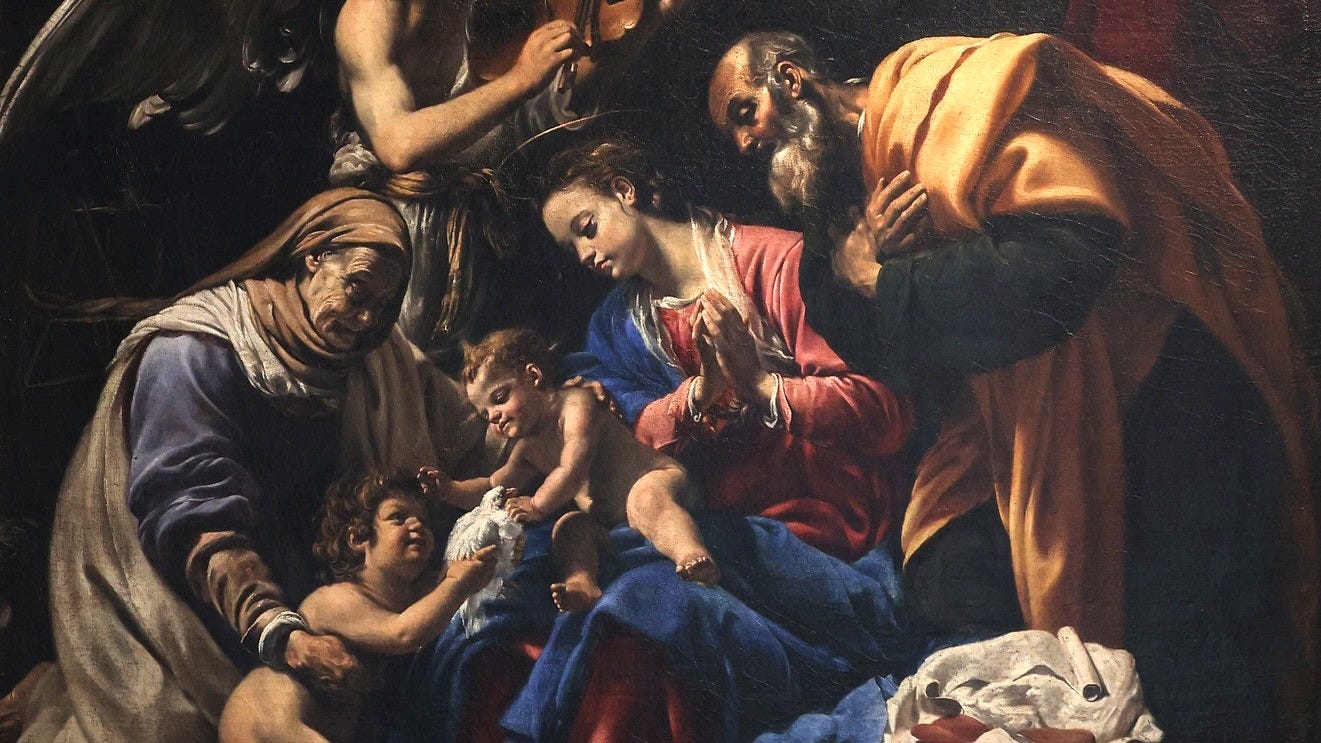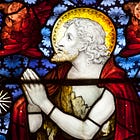The Baptist: the greatest prophet, but less than the least in the Kingdom?
Christ's words on St John the Baptist affirm the superiority of the New Covenant, and the divine power of the sacraments, the Word, and the grace of the Holy Ghost.

Christ's words on St John the Baptist affirm the superiority of the New Covenant, and the divine power of the sacraments, the Word, and the grace of the Holy Ghost.
In the previous piece, Fr Coleridge told us…
How Christ’s miracles confirmed His identity as the promised Messias to the disciples of St. John.
How St. John’s mission, though lacking miracles, surpassed the prophets in preparing the way for Christ.
How Christ’s praise of St. John corrected misconceptions about his supposed doubts.
That Our Lord’s witness to St. John foreshadows the public glory He promises to all His faithful servants—a testimony of love and justice from the Sacred Heart itself.
In this chapter, Fr Coleridge tells us…
Why St. John the Baptist holds a unique place in salvation history as one of the few individuals explicitly foretold by prophecy.
How his mission combined the roles of prophet and apostle
How he fulfilled his mission of preparing hearts for Christ through penance and baptism.
He also explains Christ’s enigmatic words about St. John’s greatness under the Old Covenant, and what he means when he compares it to “the least in the Kingdom.”
This Gospel is read on the Second Sunday of Advent.
It is curious that the Advent Gospel readings appear in reverse chronological order:
The last witness of St John the Baptist (and Our Lord’s witness to him)
St John the Baptist’s declaration of his mission
The first witness of St John the Baptist.
This reverse chronological order also recalls the curious mnemonic ‘ERO CRAS,’ spelt out by a reversal of the ‘O Antiphons’ from the 17th December. It is as if the Roman liturgy is engaging in a kind of “countdown” to Christmas.
These readings also show how central the Forerunner of Christ is in this period.
Naturally, this is because St John the Baptist went before Christ, to prepare the people for his coming. There is a fittingness about these readings appearing in Advent.
However, we should recall that on a strictly rationalist or historical basis, St John the Baptist was still a mere infant at the time of the Nativity. He was not preparing for Christ’s birth, but for his mission and his manifestation.
As such, while readings about his mission certainly has applicability to the historical event of Christmas, they also point to what we have been discussing elsewhere, namely the focus which Advent has on the second coming of Christ at the end of time.
We have addressed this, and how the Roman Liturgy presents this matter, below:
Our Lord’s Witness to St John the Baptist
From
The Training of the Apostles Vol. II
Fr Henry James Coleridge, 1889, Ch. XIV, pp 267-273
St. Matt. xi. 7-19; St. Luke vii. 24,25;
Story of the Gospels, § 53
Sung on the Second Sunday of Advent
St John the subject of prophecy
We may now dwell for a moment on each one of these praises or prerogatives of St. John in the mouth of our Blessed Lord.
In the first place, our Lord is speaking, not of the personal character or interior sanctity of St. John, which certainly could not be discerned by the multitudes who went out to see him, but of his office and position in the Providential introduction of the Kingdom of Heaven.
That St. John’s sanctity was pre-eminent cannot be doubted, and we have spoken elsewhere of the gifts of grace which had been bestowed upon him for the due discharge of his great commission. But our Lord is speaking of his greatness in the place which he occupied in the counsels of God for the Redemption of the world. To this class of greatness belongs the fact that he was himself the subject of prophecy.
Not only had he appeared, like the other prophets, at the moment in the sacred history when his work was to be performed, but he had been specially promised by the last of the Prophets before him.
Now this is a singular privilege, for in the whole range of Scripture prediction, whether by word or by type, it is our Lord and our Blessed Lady only, besides St. John, who are thus foretold, except indeed that we may consider that the position of St. Joseph in the Kingdom of our Lord was prefigured by that of the Patriarch Joseph in the land of Egypt, as related by the author of the Book of Genesis.
We may perhaps find some hints of this kind in Scripture, but the two great figures in prophecy are undoubtedly our Lord and His Blessed Mother. And yet we find a distinct prediction of the mission of St. John Baptist, as has been said.
The special object of his mission
The second prerogative of St. John, of which our Lord here speaks, is the special object of his mission. He was sent, not simply to predict the coming of our Lord, but to prepare the way before Him.
‘Thou shalt go before the face of the Lord to prepare His way,’ the father of the Baptist had himself sung on the occasion of his naming and circumcision, ‘to give knowledge of salvation to His people unto the remission of their sins, through the bowels of the mercy of our God, in which the Orient from on high hath visited us. To enlighten them that sit in darkness and in the shadow of death, to direct our feet into the way of peace.’
This involves a great commission, for it has a part of the apostolic office as well as of the prophetic office. And we know how well and faithfully St. John had discharged this part of his commission, and how, as St. Luke goes on to observe, he had actually prepared the way of our Lord in that part of the people who were really to avail themselves of the salvation which he announced.
Moreover, he had another office to discharge which may be distinguished from that of simple preparation of the people for our Lord, in that he had marked Him out and borne witness to Him, when He had come.
The children of women
The next part of our Lord’s witness to the greatness of His Precursor consists in His saying about the children of women, of whom no one had arisen greater than St. John. Here again it must be remembered that our Lord is speaking of his office and position, and is not entering on the subject of the pre-eminent personal sanctity of St. John.
‘Amen I say to you, amongst those that are born of women there hath not arisen a greater Prophet than John the Baptist.’
The phrase, ‘born of women,’ is a common one for all men, and it need not be considered of necessity that our Lord uses it on purpose to exclude Himself, Who was born of a pure Virgin, not in the usual way of human births, or that Blessed Virgin Mother herself, who was born in a different way from all others, by reason of her Immaculate Conception. For it is not our Lord’s way thus to speak of Himself when He makes comparisons of this kind, nor does the pre-eminent grace and position of the Blessed Mother of God come into consideration in the question between the commission of St. John and that of the other Prophets.
It seems natural to think that our Lord is here repeating, in another and a comparative form, what He has already said as to the greatness of the commission given to St. John, for the purpose of afterwards, as we shall see, exalting the commission given to the Gospel preachers and prophets. St. John, on many accounts which have already been named, is one than whom no Prophet is greater, for he was in so peculiar a way the Forerunner of our Lord, the one who prepared the people for Him, the one who pointed Him out, the one who had prophesied, so to say, in his mother’s womb, when he leaped for joy at the presence of our Lord and His Blessed Mother.
He has a large share even in the Gospel preaching, for his preaching it was that prepared the hearts of men, by penance and confession and baptism, to receive our Lord. In these and other things he has no equal, certainly no superior, in the whole band of great Prophets who have risen up in the history of the chosen people. He stands between the two covenants, as it were, crowning the Old Testament with its very greatest glory, and opening the door for the New Testament. And yet, our Lord adds,
‘He that is the lesser in the Kingdom of Heaven is greater than he.’
The rest of this commentary is for members.
Here is the previous part:
Here’s why you should subscribe to The Father Coleridge Reader:
Coleridge provides solid explanations of the entirety of the Gospel
His work is full of doctrine and piety, and is highly credible
He gives a clear trajectory of the life of Christ, its drama and all its stages.
If more Catholics knew about works like Fr Coleridge’s, then other works based on dubious private revelations would be much less attractive.
But sourcing and curating the texts, cleaning up scans, and editing them for online reading is a labour of love, and takes a lot of time.
Will you be a part of this project and hit subscribe?



